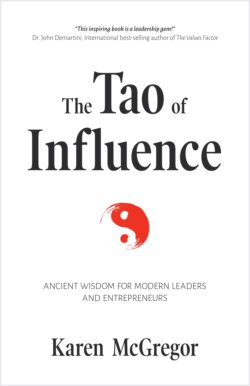Читать книгу The Tao of Influence - Karen McGregor - Страница 6
На сайте Литреса книга снята с продажи.
ОглавлениеForeword
The first time I read Lao Tzu’s masterpiece, the Tao Te Ching, I had recently finished my studies at a respectable Jesuit university in Chicago. Within weeks of graduation, I’d met the woman I would one day marry, and she exposed me to mystical traditions of other religions and philosophies, including the fresh and exciting world of New Age spirituality, which was just beginning to emerge. One of the first things that drew me to Linda was her spiritual curiosity; it was something I could relate to, but only through the perspective of my Catholic upbringing.
Within days of meeting her, I devoured my first non-Catholic spiritual book—Paramahansa Yogananda’s Autobiography of a Yogi—and my world was forever changed. I began to haunt the shelves of the tiny New Age bookshop around the corner from my apartment. It was filled with crystals, channeled books and tapes, and a wide assortment of other out-of-the-box material that made my mind spin. Everything there was fresh and exciting, and it made me feel like I was part of something important, something that might one day change the world. It was 1984, and my life had found a new orbit.
The next book I read was the Tao Te Ching.
How is it possible that such wisdom existed without me knowing about it? It’s true: I was a bit sheltered—okay, maybe more than “a bit”—but the book was so far beyond anything I had been exposed to before, that I could almost feel the earth shaking beneath my feet. A gentle presence drifted around me like incense as I read each page.
And that’s what brings me to Karen’s profound offering. Presence! That was the key, and that’s what Karen captures in this wonderful new book.
When I agreed to write this foreword, I thought I would have a lot to say. After all, the Tao Te Ching has been a staple in my spiritual diet since I first discovered it all those years ago. But now, as I sit writing these words, I find myself nearly mute, as if the words are less important than the presence they inspire. Isn’t that what Lao Tzu hoped to communicate? How many books have passed through the centuries with such grace because the author never sought to institute a religion or even a spiritual community? Lao Tzu simply responded to the heartfelt request of someone who had benefited from his wisdom and convinced him to write it down. And we are the grateful beneficiaries of that request.
Is The Tao of Influence about how to embody the Tao to influence people—or is it about something deeper? The answer to both questions is: “Yes.” The only true influence we have is our presence. Words alone can never come close to the deep communication produced by a simple smile or an energetic embrace, especially if we’re not trying to change the other person. And that’s the key. Trying to change someone to meet our idea of who they should be is a misuse of what Lao Tzu would call the “true Tao.” The Tao of Influence is about influence, but not from the level of control or ego. We are called to inspire people to become “influencers” in a world that’s very much in need of positive examples. When we use our presence in this way, people—and even the world—can be transformed.
I can certainly attest to this in my own life. I’ve seen that presence is the great influencer; concepts are not. For over twenty years, I’ve traveled around the world to share peace concerts in troubled countries like Bosnia, Iraq, and Northern Ireland. As a Peace Troubadour, I demonstrate the power of presence through song, and now and then, through a few well-placed words. As St. Francis of Assisi said: “Our only job is to teach the gospel wherever we go, and, when necessary, use words.” Each time I traveled to a country at war to perform the Peace Concert, I would invite people to join their prayerful intentions together at the same time, and extend it to the country I was performing in. Millions of people often responded, not due to any power of my personality, but due to the presence behind my personality—the presence of I AM, which we all share.
Now, something new has come along that is just as powerful as the Tao Te Ching. Karen brings into focus something that is so important for the times we find ourselves in. If anything is going to save our world, what she describes here will! It’s one thing to watch the world spin out of control—it’s quite another to offer the balm that the world needs to heal and transform. This book captures what I’m trying to describe here, and we are all blessed for it.
James Twyman, Peace Troubadour
Ajiic, Mexico
October 23, 2019
